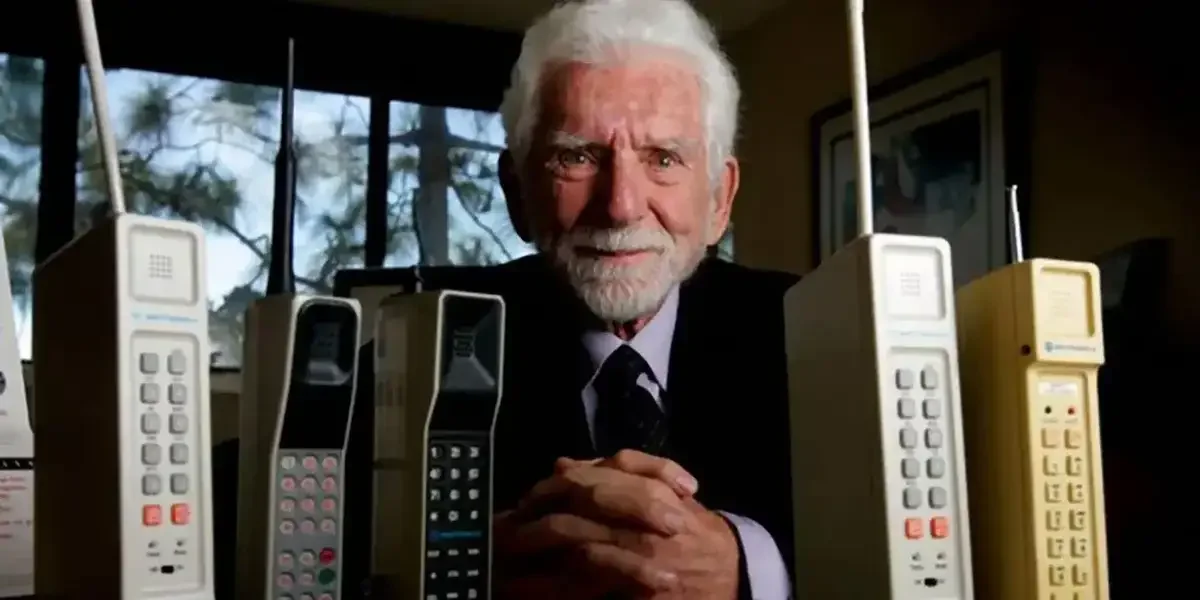The first phone call with mobile took place 50 years ago on April 3, 1973. How far technology has come since then and where it will take us in the near future.

It's been 50 years since the first wireless call mobile phone. On April 3, 1973, Motorola engineer Martin Cooper made the world's first wireless cell phone call from Manhattan to commercial opponent of Dr. Dr. Joel S. Engel of Bell Labs in New Jersey.
Ο Μάρτιν Κούπερ μαζί με ένα τσούρμο δημοσιογράφους, είπε υπερήφανα στον Ένγκελ "Τζόελ, είμαι ο Μάρτι. Σε καλώ από ένα κινητό τηλέφωνο, ένα πραγματικό φορητό κινητό τηλέφωνο".
Imagine Engel's face as he works with AT&T to be the first to make the same discovery!
"Υπήρξε μια σιωπή στην άλλη άκρη. Υποψιάζομαι ότι έτριβε τα δόντια του", θυμάται ο Κούπερ για την ιστορική κλήση σε μια BBC interview the 2011.
In our day people and especially the young kids find it hard to understand how revolutionary this call would be. Many compare it to the first telephone call ever made by Alexander Graham Bell in Boston on March 10, 1876.
Mobile phone and history
The first cordless cell phone Cooper used was an early prototype of what would later become the DynaTAC 8000X. Needless to say, for its time the DynaTAC was a true engineering marvel. It worked on a 1G network and ten years later, in 1983, the phone was available in stores on USA for $3.995 (roughly $12.000 today).
For those who grumble about their phone, the DynaTAC lasted just 30 minutes of talk time and required 10 hours to charge. At that time as you understand voicemails became popular,
Eight years later, in 1991, 2G appeared, and shortly after that, in 1995, VoIP (Voice over Internet Protocol) came along, which helped people save money by allowing calls to be made over the Internet instead of the cellular network. In 1999, the Japanese Kyocera VP-210 became the first phone with a camera and video.
The age of smartphones and the internet
Today, 50 years after the first mobile phone call, there are twice as many phones as there are people. And thanks to Moore's law, smartphones have become so powerful that we now use them not only for communication, but also for entertainment, work, navigation, education, fitness, translation, data storage and more.
It is essentially a small cell phone computers who by the way also makes phone calls!
Cooper's future and vision
Many believe that technological development has slowed down and that smartphones have peaked, since everything looks pretty much the same anymore. While this is true to some extent, there is much more to look forward to, much more than you might imagine.
«Είμαστε ακόμη στα σπάργανα αυτού που ονομάζουμε κινητό τηλέφωνο και προσωπικές επικοινωνίες», δηλώνει ο Cooper σε μια συνέντευξη του. "Σκεφτείτε πόσο αφύσικο και άβολο είναι να θέλετε να μιλήσετε με κάποιον και να κρατάτε αυτό το επίπεδο πλαστικό κομμάτι στο κεφάλι σας. Δεν έχει κανένα απολύτως νόημα", υπονοώντας την εμφυτεύσιμη τεχνολογία κάτω από το δέρμα.
Το όραμα του Cooper για το μέλλον είναι να "απαρχαιωθεί η εφαρμογή, και να υπάρξει κάτι που να δημιουργεί την εφαρμογή για εσάς". Κάτι που σχετίζεται με έναν κόσμο, όπου η τεχνολογία συνδυάζεται με το φόντο της καθημερινής ζωής. Το να καλέσετε κάποιον θα πρέπει να είναι τόσο απλό όσο να κάνετε μια σκέψη, και να μην απαιτεί το άνοιγμα μιας εφαρμογής, την κλήση ενός αριθμού και το πάτημα ενός κουμπιού.
It is possible that we too will be able to see such a world, where there will be incredibly fast networking (let's call it 10G), mixed reality, artificial intelligence, smart glasses and everything to be done with thought alone. This future may no longer be the stuff of science fiction, but something we can achieve in the next 50 years.





